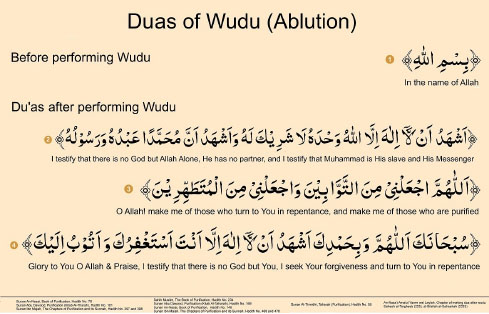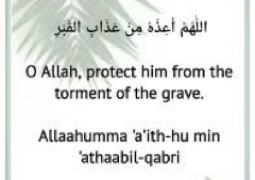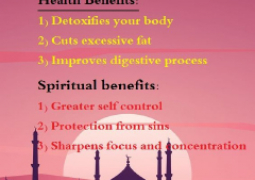
There is nothing confirmed from the Prophet, upon whom be peace, regarding supplications during ablution save the hadith of Abu Musa al-Ash’ari who said, “I came to the Messenger of Allah with water. While he was performing ablution, I heard him supplicate, ‘O Allah, forgive my sins. Make my residence spacious for me and bless me in my provisions.’ I said, ‘O Prophet of Allah, I heard you supplicating such and such.’ He said, ‘Did I leave anything out?”
(Related by an-Nasa’i and Ibn as-Sunni with a sahih chain.) An-Nawawi includes this event under the chapter, what is to be said after one completes the ablution, and Ibn as-Sunni has it under, What is to be said when one is in the state of ablution. An-Nawawi holds that both meanings may be implied from the hadith.
Supplication after ablution
‘Umar reported that the Prophet, upon whom be peace, said, “If one completes (and perfects) the ablution and then says, ‘I testify that there is no god except Allah, the One Who has no partner, and that Muhammad is His slave and Messenger,” the eight gates of paradise will be opened for him and he may enter any of them that he wishes.” (Related by Muslim.)
Abu Sa’eed al-Khudri reported that the Prophet said, “Whoever makes ablution and says, ‘Glory be to Thee, O Allah, and the praise be to Thee. I bear witness that there is no god except You. I beg Your forgiveness and I repent unto you,’ will have it written for him, and placed on a tablet which will not be broken until the Day of Resurrection. This hadith is related by at-Tabarani in al-Ausat. Its narrators are of the sahih. An-Nasa’i has it with the wording. “It will be stamped with a seal, placed below the throne, and it will not be broken until the Day of Resurrection.” The correct statement is that it is mauqoof.
As for the supplication, “Allah, cause me to be from among the repentant, and cause me to be from among the pure,” it has been narrated by at-Tirmizhi who said, “Its chain is muzhtarib and there is nothing authentic concerning this (supplication).”
Praying two rak’ah after ablution
Abu Hurairah reported that the Messenger of Allah, upon whom be peace, said to Bilal, “O Bilal, tell me what good deed you have done in Islam that I hear the sound of your footsteps in Paradise?” Bilal said, “That after I purify myself during the day or night, I pray with that purification as much as Allah has destined for me.” (Related by al-Bukhari and Muslim.) ‘Uqbah ibn ‘Aamr related that the Messenger of Allah, upon whom be peace, said, “If one performs and perfects his ablution and prays two rak’ah with his heart and face (completely on his prayer), Paradise becomes his.” (Related by Muslim, Abu Dawud, Ibn Majah and Ibn Khuzaimah in his Sahih.) Khumran, the client of ‘Uthman, added, “I saw ‘Uthman call for water for ablution, pour it from the pot onto his right hand and wash it three times. He then put his right hand into the container, rinsed his mouth and nose and blew the water out. Then he washed his face three times, followed by his arms up to the elbows. Then he washed his feet three times and said ‘I saw the Messenger of Allah, upon whom be peace, make ablution like this.’ And then he would say, ‘Whoever makes ablution like this and then prays two rak’ah without having any other concern on his mind, all his past sins will be forgiven.” (Related by al-Bukhari, Muslim and others.) Other practices (protecting the eyes and wrinkles, removing any rings, wiping the neck, and so on) have not been mentioned here as their narrations are still questionable. But, one may follow them as part of general cleanliness.
Nullification of ablution
It is not desirable that one who is making ablution should leave any of the sunan that have just been mentioned. The person would then lose the great reward of these (simple)acts. Anytime one abandons the Sunnah, he has done a disliked deed.
A: An excretion of the penis, vagina or anus
This would include urine, feces (Allah says, “...or one of you comes from relieving himself,” thus proving that such an act obligates a new purification), and releasing gas from the anus. Abu Hurairah reported that the Messenger of Allah said, “Allah does not accept the prayer of a person who has released gas until he makes a new ablution. A person from Hazhramaut asked Abu Hurairah, “What does releasing gas mean?” He answered, “Wind with or without sound.” (Related by al-Bukhari and Muslim.) He also narrated that the Prophet said, “If one of you finds a disturbance in his abdomen and is not certain if he has released any gas or not, he should not leave the mosque unless he hears its sound or smells its scent.” (Related by Muslim.)
Hearing the escaping gas or smelling it is not a condition for nullifying ablution, but he stressed that one should be certain of the action. As for al-Mazhi (prostatic fluid), the Prophet said, “Make ablution.” Concerning sperm or al-mani, said Ibn ‘Abbas “It requires ghusl and for al-mazhi and al-wadi, wash your sex organs and make ablution.” This was related by al-Baihaqi in his Sunan.
B: Deep sleep that makes a person completely unaware of his surroundings
If the person did not keep his buttocks firmly seated on the floor while sleeping, he must make a new ablution. Safwan ibn ‘Asal said, “The Prophet, upon whom be peace, used to order us while we were travelling not to take our socks off unless we were in post-sex impurity (i.e. not for defecation, urination or sleep).” (Related by Ahmad, an-Nasa’i and at-Tirmizhi, who graded it sahih.) If one’s buttocks has remained firmly on the floor during his sleep, no new ablution is necessary. This is implied by the hadith of Anas who said, “The companions of the Prophet were waiting for the delayed night prayer until their heads began nodding up and down (from drowsiness and sleep). They would then pray without performing ablution.” (Related by ash-Shaifi, Muslim, Abu Dawud and at-Tirmizhi.) The wording that at-Tirmizhi recorded from the chain of Shu’bah is, “I have seen the companions of the Prophet sleeping to the extent that one could hear some of them snoring. But, they would stand for prayer without a new ablution.” Said Ibn al-Mubarak, “In our opinion, this happened when they were sitting.”
To be continued




